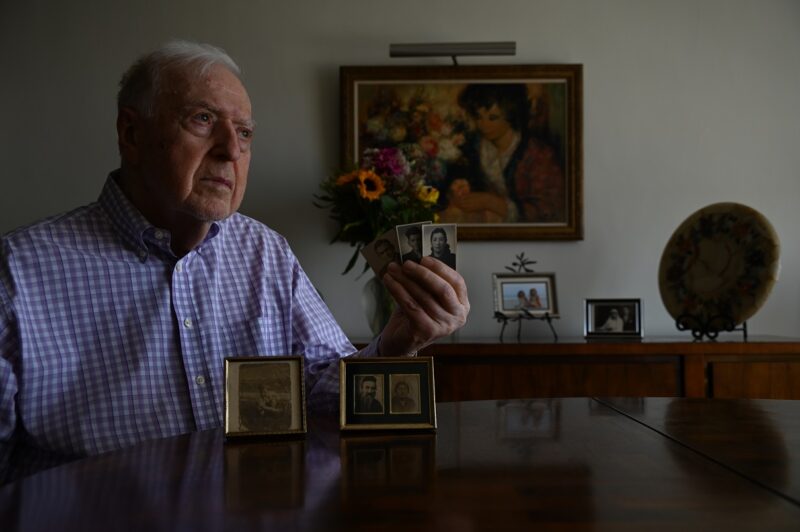
Eugene Ginter
Auschwitz Holocaust survivor
“I was born on February 8, 1939, in Kraków, Poland, seven months before the outbreak of World War II. The German occupation of Poland and its consequences were very difficult for us, as the Nazis began to enforce their anti-Semitic racial laws on all Jews in Poland. We were forced to wear the notorious yellow badge that marked us as Jews, and lived in constant fear. In 1942, a German officer came in with his mistress and barged into our house, informed us that our beautiful home was being confiscated and taken over by him. I remember that we had to pack our lives into just a few suitcases, and that same day, we were moved to the ghetto in the city, which was very close to our apartment.
My father spoke perfect German and was a skilled electrician with a golden touch – two abilities that proved very useful in the ghetto. He helped build and repair the electrical grid and even managed to build and maintain the ghetto’s power station. When I asked my father how he managed to do all these things, he simply told me, ‘It’s amazing what you can do when a loaded gun is pointed at your head.’ My mother worked as a forced laborer at Oskar Schindler’s enamel factory (a factory that produced metal goods), so like my father, she was considered valuable to the Nazis. That is why my parents were not sent from the ghetto to the Auschwitz extermination camp, which was only about an hour’s drive from the ghetto.
In a normal world, most children play with toys and go to school. I, on the other hand, was left alone in the ghetto to survive on my own. My parents were gone all day – my father working as an electrician, my mother forced into labor, and I had to learn how to navigate a world ruled by fear and death. My “toys” were bones I found on the ground.
My entertainment? Standing with the other prisoners, watching public executions. Not your typical childhood.
My entertainment? Standing with the other prisoners, watching public executions. Not your typical childhood.
But I was lucky, my father, who spoke fluent German and was one of the ghetto’s essential workers, managed to find out in advance when the next child deportation actions were planned. That way, he could warn me. He would tell me to hide, and in doing so, he saved my life several times. During those actions, my parents never knew if I had survived. They were left in the dark, terrified for my safety, and only when I returned home late at night could they know I had made it through.
Life in the ghetto was hard. Every day, we were counted again, and this roll call could take hours. Because of constant hunger, disease, and severe overcrowding, some people simply didn’t survive the night. So, every day, they had to count us again and again until the number of prisoners matched. We would stand for hours in the sun, in the rain, or in the snow, just waiting for the count to end. Of course, during all those hours, we weren’t allowed to use the bathroom, so if you had to relieve yourself, you simply did it on yourself.
The German guards in the camp enjoyed humiliating us on a daily basis, and I remember one especially painful moment when my father was beaten by a German soldier. It was a humiliating scene because everyone watched as he was struck. I remember crying and wanting to help him, but I couldn’t do anything. It was a deeply painful feeling of total helplessness.
Life in the ghetto – and just as importantly, surviving it – depended heavily on sharp instincts and a great deal of luck.
I remember one day, I found myself in an area of the ghetto where I wasn’t supposed to be. Suddenly, a German officer pulled up in his car. I froze. Without thinking, I stood straight and saluted him. That salute – from a small, frightened child – seemed to amuse him. And by sheer luck, instead of shooting me on the spot, he simply drove away laughing.
I remember one day, I found myself in an area of the ghetto where I wasn’t supposed to be. Suddenly, a German officer pulled up in his car. I froze. Without thinking, I stood straight and saluted him. That salute – from a small, frightened child – seemed to amuse him. And by sheer luck, instead of shooting me on the spot, he simply drove away laughing.
On March 13, 1943, the Nazis decided to liquidate the ghetto, and my parents and I were transferred to the Plaszów concentration camp, located several kilometers away. Once again, we managed to survive the ordeal – the starvation, the diseases, and the horrors. Two years later, as the Red Army advanced, the Germans decided to liquidate this camp as well, transferring the remaining prisoners to the Auschwitz extermination camp.
When my father saw me being loaded onto the cattle car bound for Auschwitz, he pleaded with the camp commander to join me. He couldn’t bear the thought of me dying alone in the gas chamber. When other fathers saw that my father’s request had been granted, they too asked to join their children, and one by one, they climbed onto the cattle car.
The journey from Krakow to Auschwitz should have taken no more than an hour, but luckily, it took us nearly two weeks to arrive. Due to the Red Army’s bombings, many of the railway tracks were damaged, and the Germans struggled to transport us to the camp. The train ride itself was unbearable. We had almost no food or water.
But my father, with his resourcefulness, managed to convince the German soldiers to trade two bottles of vodka for a diamond he had. That vodka would end up saving our lives.
But my father, with his resourcefulness, managed to convince the German soldiers to trade two bottles of vodka for a diamond he had. That vodka would end up saving our lives.
When we arrived at Auschwitz and stood before Mengele’s selection, he looked us over and simply said, “Take this pile of shit away!” They began to march us toward the gas chambers.
But then, just before we reached them, I saw Mengele receive a note. He read it, then shouted, “Stop!”
The note contained an order from Berlin to halt the gas chamber executions due to the approaching Red Army. The new directive was to only burn the remaining bodies. If our train hadn’t been delayed for so long, it’s almost certain that I wouldn’t be here speaking with you today.
But then, just before we reached them, I saw Mengele receive a note. He read it, then shouted, “Stop!”
The note contained an order from Berlin to halt the gas chamber executions due to the approaching Red Army. The new directive was to only burn the remaining bodies. If our train hadn’t been delayed for so long, it’s almost certain that I wouldn’t be here speaking with you today.
After Auschwitz, I was sent to Birkenau, where I spent about three months. As the Soviet forces drew closer, the Nazis began transporting the surviving Jews to other concentration and extermination camps within Germany – by train and through long death marches. My father was transferred to the Mauthausen concentration camp.
Before he was loaded onto the train, he ran to me to say goodbye and told me, “No matter what, don’t fall behind! Because on the death marches, they shoot those who can’t keep up.”
When the Germans decided to liquidate Birkenau, I managed to hide with a few friends in a German bunker filled with schnapps. With nothing else to drink, we drank it, and by the day the camp was liberated, I was a little drunk.
Because I had trouble keeping my head upright, the Russian soldiers mistook me for someone whose neck had been broken.
After the war, I was taken to an orphanage in Kraków. My mother, who had also survived, heard that I was there and came searching for me. She eventually found me, and it was one of the most emotional moments of my life.
Later, we learned through radio broadcasts that my father was alive as well – he was in Linz, Austria. It took us several days to reach Linz, but in the end, against all odds, we were reunited. We survived the Holocaust.
Later, we learned through radio broadcasts that my father was alive as well – he was in Linz, Austria. It took us several days to reach Linz, but in the end, against all odds, we were reunited. We survived the Holocaust.
Twenty years ago, I returned to Auschwitz with my wife, daughter, and son-in-law – but this time, as a free man. It was an emotional and, at times, absurd experience. When I went to buy tickets to enter the camp, I told the ticket seller in Polish that the last time I was here, I entered for free… As I walked around the camp, everything was so clean and orderly. There was even a young man mowing the grass! I couldn’t help but laugh because, 80 years ago, there’s no way anyone would have been walking around Auschwitz with a lawnmower. As a Holocaust survivor who had been in Auschwitz, revisiting the camp felt in a way. surreal. But it was also a moment of triumph. Against all odds, I survived, and now I’m here again as a free man, visiting this place with the family I created.”
